Opponents of the Comcast/Time Warner Cable merger have scrambled to show that companies with larger market shares will hurt consumers, proposing theories built around flawed assumptions. This includes arguments that the new Comcast will suddenly become the only provider or saying that the deal will make the new Comcast a monopsony purchaser of television content.
One metric that they have stumbled upon is data from the American Consumer Satisfaction Index (ACSI), which gives Comcast, Time Warner Cable, and other television and Internet service providers low scores as compared to other industries.
This finding has been used to argue that a larger company will result in less competition and lower customer satisfaction. However, before jumping to this broad conclusion it would be helpful to actually look at the reason for the low scores and what they say about the market.
This is what the ACSI data actually shows.
Providing reliable, high-quality Internet and television services across a national network is much more difficult than taking a hamburger order or shipping products bought online. When things go wrong, people notice immediately that their computers and TV stopped working and blame providers, even when fault lies elsewhere. I remember years ago when my DSL speed had slowed to a crawl. I called up my ISP ready to read them the riot act, only to have them walk me through some steps which determined that the problem was on my end due to a defective phone splitter. (Oops, never mind!) This is one reason why low consumer scores are traditionally seen for large, complex industries with a lot of moving parts (the three industries with the lowest ACSI rankings are pay-tv providers, internet providers, and airlines). Where a lot can go wrong, much of it beyond the control of the provider, it’s tough to keep customers happy.
Second, greater size does not equal poorer service. Proof can be found by comparing United States data with ACSI’s British sister, the National Consumer Satisfaction Index. Even though the British marketplace contains more competitors, UK television and Internet providers get scores just as low in comparison to other British industries and U.S. TV and Internet providers. Television providers receive a 68 in both countries, while Britain’s consumer satisfaction rate for Internet providers is only 2 points higher (67 vs. 65).
The similarity in the U.S. and UK scores is striking, and the fact that UK ISP scores are similar, even with the type of wholesale, “open access” regime cable critics long for, is a key point. The UK has an extensive unbundling regime – the regulator has gone so far as to require the incumbent, BT, to create a separate entity dealing only in wholesale. When this policy results in the same level of consumer satisfaction, calls for greater competition (e.g., forced unbundling, government subsidized competitors, etc.) or greater regulation (classifying broadband under Title II) seem weak. Service-based competition through unbundling is not a good solution to consumer woes – it saps incentive to invest in networks and doesn’t result in higher consumer satisfaction. And more government induced network overbuilding just raises total production costs, which ultimately consumers will bear.
The problems that the ACSI identifies are not the results of economic inefficiencies deeply imbedded in the industry. Scores for television service providers in areas such as picture quality, range of available channels, and keeping outages to a minimum were quite high. Using only those metrics, the pay-tv market would rank on par with breweries and major appliances – and who doesn’t love their fridge and their beer! What drags down scores for both internet and TV providers are scores for call centers and web-pages. That consumers dislike call centers is hardly news. But one reason for the dissatisfaction is that unlike problems with our beer (put it in the fridge then pop it open and you are good to go) problems with our broadband service are often highly complicated and technical and as a result, highly frustrating.
Finally, ACSI data shows that broadband and TV providers are steadily improving. Ratings for the pay-tv industry as a whole grew 3 percentage points from 2012 to 2013 (ratings from 2012 for Internet providers were not available). Cable companies know they have a poor reputation for customer satisfaction, and have been focused on improving it. It appears that focus is paying off. Constraining Comcast and Time Warner Cable from utilizing economies of scale to lower costs for consumers will not magically make automated call centers more fun to navigate.
Fear not. The merger will be carefully scrutinized by the FCC and DoJ. In the meantime, do not listen to unfounded predictions that a merger would make call centers even more odious.

